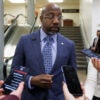I don’t agree with Guinness’s decision to withdraw their sponsorship of New York City’s St. Patrick’s Day parade over the city’s decision to not permit groups holding signs about same-sex relationships to march.
But I’m thrilled Guinness executives had the freedom to make that decision, to follow their own morals and adhere to their own values – assuming it was about that, and not about the pressure Guinness faced from gay-rights organization GLAAD, which was vigorously pushing Guinness and other parade sponsors to withdraw.
Now to be clear, there was no attempt to ban gay and lesbian individuals from marching in the parade. The issue was whether they could hold signs at a St. Patrick’s Day parade that focused on their sexual identity: “Organizers of the annual parade have said gay groups could march in the procession but could not carry signs or identify their sexuality,” reported the New York Times. And while no one was permitted to hold up signs supporting same-sex marriage, nor was anyone in the parade holding up signs opposing same-sex marriage. The parade was simply quiet on the issue – which makes sense because this is a parade about St. Patrick, not about marriage.
Guinness isn’t alone: Heineken also stopped sponsoring the New York parade, while Sam Adams withdrew support from the Boston parade. Both Heineken and Sam Adams faced pressure from gay activists as well.
And that’s fine – because in a country as ideologically diverse as the United States, we’re never all going to see eye to eye on every moral issue. That’s why it’s so crucial that we be allowed to make our own decisions, as individuals and as employees and as business owners, that adhere to our values – not to those values that the government or the majority of Americans currently favors.
As a traditional marriage supporter, I’m no fan of Guinness’ call to withdraw from sponsoring the parade – particularly when the parade organizers decide to be neutral on the issue, rather than take a position one way or another. But I hope that those who do support same-sex marriage will have the same attitude of polite disagreement and civil tolerance going forward.
Let’s just imagine the situation reversed. In Alabama, for instance, let’s say there was a Thanksgiving parade. Traditional marriage advocates wanted to march holding signs about marriage – even though the parade’s focus was on gratitude. If the organizers told the marchers “no,” and then a business decided to pull out of sponsoring the parade, would that business get respectful coverage from the mainstream media and activists?
Probably not. And that discrepancy should concern us all, because as our country grapples on these issues, we need to make sure that tolerance, not bullying, is the spirit that characterizes our dialogue.
































